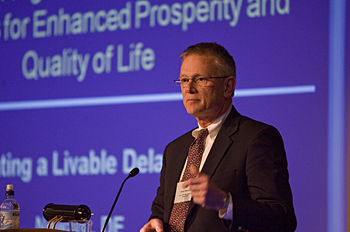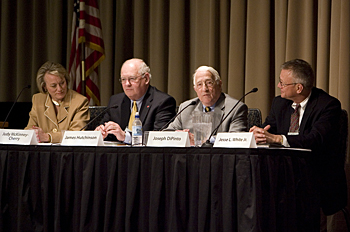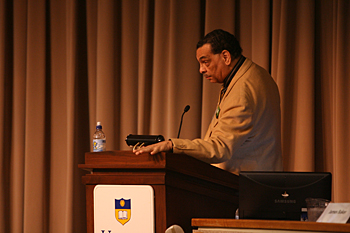
Moderated by James Baker, mayor of Wilmington, the forum began with a presentation and lecture by Jesse L. White Jr., director of the Office of Economic and Business Development at the University of North Carolina-Chapel Hill. A panel discussion followed White's presentation. The panel included White, Joseph DiPinto, director of the Wilmington Office of Economic Development; James Hutchison, assistant vice president of Commerce Bank; and Judy McKinney-Cherry, director of the Delaware Economic Development Office.
“Part of what I'd like to explore is how secondary education institutions--particularly universities--can become engaged in economic development enterprises,” White said at the outset of his remarks. “But before you can expand, some questions you have to address are: What factors are challenges in our communities, what sorts of strategies might we want to think about deploying, and what opportunities have we overlooked?”
White said that many issues facing Delaware's economic development parallel those of North Carolina and added that that is due, in large part, to the explosion in information technology and the “profound and very rapid globalization of the economy.
“These are the great changes that have shaken the pillars of the economic life that most of us grew up in,” he said.
Summarizing the basic economic building blocks of job creation and wealth creation, White said that economic development is at an intersection between public policy and private commerce and emphasized that business development and community development work hand in hand.
“We're now living in a world where competitive business cannot exist anymore in noncompetitive communities,” he said.
White also made a distinction between economic growth and economic development. He said that while economic growth was more a short-term phenomenon, economic development “is building a capacity, within your system, for self-sustaining growth.”
To begin with a “roadmap” for both, White presented a matrix that listed several areas that he believes form a solid scaffolding on which to build a plan. These areas include developing global strategies, working with secondary education institutions, strengthening regional approaches and strategic visioning--encouraging and even providing seed money and grants for promising entrepreneurial ventures.DiPinto, responding to the importance of including secondary education institutions in economic development plans, said that “any university has a great value in any community,” and added that recent announcements made by UD give it at an advantage in the arena of economic development.
DiPinto said that a major hurdle for optimal economic development is accepting change and growth. “We need to look beyond our borders in order to maximize our assets,” he said, “and this isn't easy to do. But our ability to adjust to change has been relatively good in the past, and we have moved over time to a diverse economy that has helped with economic downturns.”
Hutchison, who was the mayor of Dover, Del., from 1994-2004, said that he learned as a public official that a major source of economic strength can quickly vanish. “One lesson I learned early on was to never assume that every job you have today will be here tomorrow,” he said.
He spoke of the importance of being proactive in working with local and federal government officials and emphasized that Delaware is in an enviable spot with its various economic niches.
“In being proactive, we must also be sure to tie in the educational resources we have available,” he said, “and when I look at Delaware, I see opportunities, one of these being the ability to form partnerships.”
Huchison talked about how recruiters, headhunters and company CEOs always inquire about a local community's investment in secondary education and added that “quality of life begins with having a quality job, and this responsibility belongs to every one of us.”
McKinney-Cherry responded to key points from White's matrix for economic success. She said that economic development was “no place for pessimists or the faint-hearted, because it is about looking at changes in innovation and growth.
“When I began my current position in 2002, I thought that the key to economic development was to balance assets and risks the way you would a healthy stock portfolio,” she said. “But when you're looking at it from that perspective, it calls into question how you support your existing businesses and how you recognize your assets.”
Touching on some local niche economies and assets (the Dover Air Force Base, Bombay Hook in Smyrna, the beaches in Sussex County) McKinney-Cherry said that Delaware would do well, economically speaking, to concentrate on “quality over quantity.”“The truth is, economic development is easy once you understand what your 'value add' is and especially what your unique 'value add' is,” she said. “We have a strategic vision. We have a regional approach. We have an entrepreneurial vision. And we have a global approach. So we are doing well on all points.
"Our goals in Delaware should not be job creation so much as shaping what we have and improving it," McKinney-Cherry said. "It's about sustainability, because when there is profitability, there follow higher wages; and when we create jobs, they must be better jobs than what we have today.”
McKinney-Cherry said that a unique 'value add' niche in New Castle County is the innovative program both DuPont and Hercules have put in place to provide grant money to visionary entrepreneurs.
“A local economy must know what its assets are and build on that,” she said. “And we also need to be long-sighted: If we are to put a program in place, it must have longevity.”
Article by Becca Hutchinson
Photos by Kathy Atkinson



